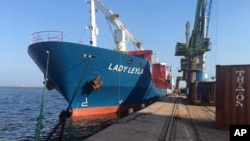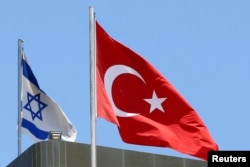Turkey sent a giant shipment of humanitarian aid, including rice, flour and toys, to Gaza on Saturday, days after reaching a deal to normalize relations with Israel.
The rapprochement and consequent aid to Gaza came as unemployment in the Palestinian strip has reached 43 percent, electricity is available for only eight to 12 hours a day, and water resources are drying up. Unless radical steps are taken, “it is not a question of if but rather when another escalation [eruption of violence] will take place,” warned Nickolay Mladenov, U.N. special coordinator for the Middle East peace process.
Turkey intends to build a power plant, a desalination facility, a hospital and houses there. Israel is going along with these plans. It no longer seeks to topple Hamas, realizing that the alternatives to it are Islamic radicals or chaos.
Gaza blockade
Turkish President Recep Tayyip Erdogan has been extremely sensitive to the situation in Gaza, which since 2007 has been governed by Hamas, a Muslim party like his own party, AKP. He was furious when Israel raided Gaza and when it forcibly foiled a 2010 attempt to break a maritime blockade of Gaza.
In that incident, Israeli marines stormed the Mavi Marmara aid ship, one of six civilian vessels trying to break the blockade, and killed 10 Turkish activists on board. In the aftermath of the attack, Turkey demanded a formal apology from Israel, compensation for the families of those killed, and the lifting of Israel’s Gaza blockade.
Turkey expelled Israel's ambassador and froze military cooperation after a 2011 U.N. report into the Israeli raid on the Mavi Marmara largely exonerated the Jewish state. Israel and NATO member Turkey, which both border Syria, reduced intelligence sharing and canceled joint military exercises.
But there was a breakthrough this past Sunday after months of talks between the two countries. And by Monday, Turkey announced that a deal would be signed normalizing relations with Israel.
Common interests
The compromise is part of a rapprochement that reflects the two countries’ common strategic interests. Moderate Sunni Muslim states are trying to contain Shi'ite Iran, which is involved in fighting in Syria, Iraq and Yemen. Israel wants to cooperate with the moderates and help the struggle against radical Muslim militants, especially in Egypt and Jordan.
The rapprochement “is an important step to prevent the creation of another Iran in the area. ... Let’s isolate our enemies, the terrorists, and ... with big and strong countries like Turkey, conclude an alliance, agreements and cooperation,” said Minister Yoav Gallant, a member of the inner Cabinet, which approved the agreement Wednesday.
“In this volatile Middle East there are few countries that have the ability to act and are stabilized enough to feel that they do not endanger their existence [by intervening]. Turkey and Israel are two of those few countries,” former National Security Adviser Yaakov Amidror told reporters.
In the 1990s, after the Madrid Peace Conference — a watershed event that brought Israel into direct, face-to-face negotiations with Syria, Lebanon, Jordan and the Palestinians — ties between Turkey and Israel grew closer.
Push by generals
Turkish generals pushed for closer relations, noted Hay Eytan Cohen Yanarocak, a Turkish researcher at Tel Aviv University’s Dayan Center for Middle Eastern Studies. Turkey’s army was fighting Kurdish rebels and sought weapons that Europeans and the Americans would not provide because of human rights concerns, he wrote.
Israel also upgraded Turkish fighter planes and tanks. Their navies held joint exercises. Israeli pilots practiced bombing runs in Turkey, and Israeli intelligence reportedly ran a station that spied on Iran.
The downturn came when Erdogan, then the prime minister, clamped down on the army. He arrested most of the generals that were involved with Israel, wrote former Israeli intelligence officer Yossi Alpher in his book Periphery. At that time, there was a peace process with the Turkish Kurds, and it reduced Ankara's need for Israel’s military support, added Yanarocak.
Turkey’s security has been worsening as Syria's situation continues to disintegrate along Turkey's southern border. The Islamic State has ransacked the town of Kilis, forcing its evacuation.





